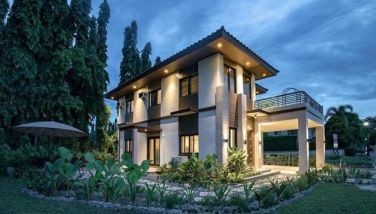GSIS offers least-cost home financing
June 8, 2002 | 12:00am
The Government Service Insurance System (GSIS) marked its 65th anniversary last month with the launch of unprecedented home financing deals allowing its members to fulfill their shelter needs at the least cost possible.
Under the Bahay Ko program, the GSIS loan window for individual housing, lending rates are now among the lowest in the market at eight percent to 12 percent. The mortgage redemption insurance (MRI) on such loans, which tends to jack up the monthly loan amortization, is no longer mandatory.
Two new shelter options have also been opened for GSIS members: renovation of their existing homes or discounted purchase of any one of the 8,000 unoccupied housing units in the GSIS portfolio. Both options are eligible under the Bahay Ko program.
Previously, GSIS members paid nine-percent to 16-percent annual interest rates on their Bahay Ko loans. With the newly-approved scheme, home loans of P180,000 and below are granted at eight- percent interest from the previous rate of nine percent; P181,000 to P300,000, at 10 percent interest from 12 to 14 percent; and loans worth P301,000 to P500,000, at 12 percent from 14 to16 percent.
GSIS president and general manager Winston F. Garcia said members with existing Bahay Ko loans, who have been religiously paying their monthly amortization, could also avail of the rate reduction.
Meanwhile, government employees with limited capacity to pay can either choose from the GSIS inventory of unoccupied houses or apply for a renovation loan with the existing homes as collateral.
Garcia said the GSIS has an inventory of 8,000 unoccupied housing units that are being sold at a 40-percent discount under the Bahay Ko loan program. While most of the units need repair, Garcia noted that these are nevertheless located in accessible areas and in subdivisions that have paved roads, entrance gates, open spaces and other community facilities. If GSIS members buy under this program, they will be granted an additional loan of up to P200,000 to restore the property.
Responding to the strong clamor among GSIS members, Garcia said the GSIS now allows loan take-outs for house repair or improvement, refinancing or transfer of an existing mortgage loan from a private or another government financial institution, and the purchase of a second-hand housing with or without additional loan for repairs/improvement.
The home improvement loan may be used to complete construction of an existing residential unit or to build an extension thereon, which improves the value of the property.
What’s exceptional about this new loan window is that it allows a GSIS member of refurbish his/her existing home or any property of choice, for as long as it is registered in the government employee’s name, his/her spouse or even a relative within the first degree of consanguinity or affinity.
The GSIS board of trustees approved the new home financing deals on May 7. At present, the maximum loanable amount under the Bahay Ko program is P500,000.
Under the Bahay Ko program, the GSIS loan window for individual housing, lending rates are now among the lowest in the market at eight percent to 12 percent. The mortgage redemption insurance (MRI) on such loans, which tends to jack up the monthly loan amortization, is no longer mandatory.
Two new shelter options have also been opened for GSIS members: renovation of their existing homes or discounted purchase of any one of the 8,000 unoccupied housing units in the GSIS portfolio. Both options are eligible under the Bahay Ko program.
Previously, GSIS members paid nine-percent to 16-percent annual interest rates on their Bahay Ko loans. With the newly-approved scheme, home loans of P180,000 and below are granted at eight- percent interest from the previous rate of nine percent; P181,000 to P300,000, at 10 percent interest from 12 to 14 percent; and loans worth P301,000 to P500,000, at 12 percent from 14 to16 percent.
GSIS president and general manager Winston F. Garcia said members with existing Bahay Ko loans, who have been religiously paying their monthly amortization, could also avail of the rate reduction.
Meanwhile, government employees with limited capacity to pay can either choose from the GSIS inventory of unoccupied houses or apply for a renovation loan with the existing homes as collateral.
Garcia said the GSIS has an inventory of 8,000 unoccupied housing units that are being sold at a 40-percent discount under the Bahay Ko loan program. While most of the units need repair, Garcia noted that these are nevertheless located in accessible areas and in subdivisions that have paved roads, entrance gates, open spaces and other community facilities. If GSIS members buy under this program, they will be granted an additional loan of up to P200,000 to restore the property.
Responding to the strong clamor among GSIS members, Garcia said the GSIS now allows loan take-outs for house repair or improvement, refinancing or transfer of an existing mortgage loan from a private or another government financial institution, and the purchase of a second-hand housing with or without additional loan for repairs/improvement.
The home improvement loan may be used to complete construction of an existing residential unit or to build an extension thereon, which improves the value of the property.
What’s exceptional about this new loan window is that it allows a GSIS member of refurbish his/her existing home or any property of choice, for as long as it is registered in the government employee’s name, his/her spouse or even a relative within the first degree of consanguinity or affinity.
The GSIS board of trustees approved the new home financing deals on May 7. At present, the maximum loanable amount under the Bahay Ko program is P500,000.
BrandSpace Articles
<
>
- Latest
Latest
Latest
October 11, 2024 - 3:45pm
October 11, 2024 - 3:45pm
October 10, 2024 - 11:30am
October 10, 2024 - 11:30am
October 5, 2024 - 12:08pm
October 5, 2024 - 12:08pm
September 24, 2024 - 1:00pm
September 24, 2024 - 1:00pm
September 13, 2024 - 4:00pm
September 13, 2024 - 4:00pm
September 9, 2024 - 9:45am
September 9, 2024 - 9:45am
Recommended



























